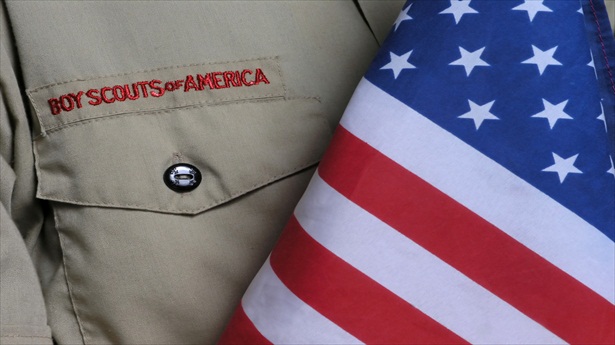
When it comes to banning homosexuals from Scouting, the Boy Scouts of America has lately found itself torn between its best friends.
On one side are the big churches that made Scouting America’s most well-known youth group and that steadfastly oppose allowing gays to join as Scouts or Scout leaders.
On the other side are a growing number of other organizations that run Scout units, as well as corporations that donate to Scouting, that in recent months have openly protested and even defied that policy.
In announcing this week that it might leave the question of gay membership up to the local organizations that run Scout packs and troops, the BSA is telling its church friends that it’s time to put this controversy behind them. That’s a big deal – perhaps the first time in its 103 years that the BSA has publicly gone against the big churches that made Scouting what it is today.
To understand why the BSA has resisted this change, consider this: From its beginning, the BSA encouraged churches to use Scouting for their own religious education; the Scout Law, after all, says a Scout is “reverent toward God.” That was “the genius of the Boy Scout Movement,” wrote William Murray, an early Boy Scout official who penned a history of the BSA. “Because of Scouting’s devotion to the spiritual element of character education and its willingness to submerge itself in the religious traditions of its sponsors, America’s churches and synagogues enthusiastically embraced Scouting.”
Today, 69.4 percent of Scout units are run by faith-based organizations, according to the BSA. (Other unit sponsors include civic organizations, such as Rotary clubs, and education-related groups, like PTAs.) Among faith-based groups, the biggest supporters are the Mormon, United Methodist and Roman Catholic churches. Representatives from those churches have long sat on the board of the BSA and hold considerable sway. For example: They blocked a proposal in the 1970s for the BSA to provide Scouts with advice about sexual matters such as puberty and pregnancy.
Psychiatrist Dr. Walter Menninger, the BSA’s health committee chair, later cited that pushback in a deposition for a sex abuse case against the BSA: Churches, he said, “have a substantial percentage of registrations [of Scouts] and become a much more potent factor” in the organization’s decisions.
The BSA’s big faith-based supporters are also among the nation’s most vocal opponents of homosexual behavior. When the BSA went to the U.S. Supreme Court in 1990 to defend its right to ban gays (Boy Scouts of America v. Dale), the National Catholic Committee on Scouting, the Methodist Men and the Mormon Church submitted amicus briefs for the corporation. The Mormons threatened to pull out of Scouting if homosexuals were allowed in – taking with them some 400,000 Scouts, about 12 percent of the BSA’s total at the time.
This support from its core constituents helps explain why the BSA has long been willing to take public heat for its ban on gays. But while the company could shrug off flak from gay advocates and the mainstream media, it could not ignore getting kicked by its own friends.
Just last July, the BSA announced that it had studied its policy on homosexuals and would not budge. That reaffirmation might have had a boomerang effect. It drew renewed attention to the issue, and several noteworthy financial backers – including Intel, UPS and local United Ways around the country – publicly dropped their support.
At the same time, a growing number of organizations that sponsor Scout units openly objected to or even defied the ban. Among the cases making headlines and spurring organized campaigns against the BSA in recent months: the denial of Eagle Scout rank to California teen Ryan Andresen because he is gay; the dismissal of Jennifer Tyrrell as den leader of her son’s Ohio Cub pack because she is gay; and the threatened de-chartering of a Maryland Cub Scout pack for putting this statement on its website: “Pack 442 WILL NOT discriminate against any individual or family based on race, religion, national origin, ability, or sexual orientation.”
Even a Mormon group, Mormons Building Bridges, has been “gathering stories of LDS units across the country who have quietly been disregarding the national [Scouting] policy,” as reported by the Salt Lake Tribune.
In explaining why the BSA is now reconsidering the policy that it affirmed six months ago, spokesman Deron Smith told The Washington Post, “Last year Scouting realized the policy caused some volunteers and chartered organizations … to act in conflict with their missions, principles or religious beliefs.” (The BSA did not respond to a Youth Today request for comment.)
Like any company, the BSA survives on the support of its core customers and constituents – in this case, sponsoring organizations, parents and corporate donors. With more and more of them openly fighting the ban on gays, national headquarters appears headed toward a states’ right approach to relieve itself of this headache: Let the locals decide, and leave us out of it.
Let the locals decide, and leave us out of it.
Patrick Boyle, communications director of the Forum for Youth Investment, is author of “Scouts’ Honor: Sexual Abuse in America’s Most Trusted Institution.”
























